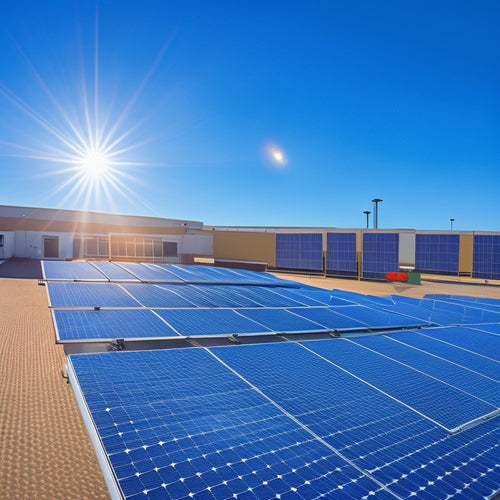
Home Batteries
Share
You're evaluating home batteries to reduce your reliance on the grid and lower your electricity bills. Home batteries store excess energy from solar panels or wind turbines for later use, optimizing energy consumption and reducing dependence on the grid. They can also address issues like unpredictable grid rates and unexpected power outages. By selecting the right battery technology, you can minimize energy waste, reduce standby power consumption, and prioritize critical energy needs. As you investigate the world of home batteries, you'll want to assess factors like cycle life expectancy, battery depth ratings, and total wattage requirements - and that's just the beginning of your expedition towards energy independence.
The Essentials
- Home batteries store excess energy from solar panels or wind turbines for later use, reducing reliance on the grid and lowering electricity bills.
- They optimize energy consumption to address issues like unpredictable grid rates and unexpected power outages, enhancing energy resilience and grid security.
- Home batteries can reduce electricity expenses by storing energy during off-peak hours and minimizing reliance on the grid during peak usage.
- Proper selection and maintenance of home batteries, considering factors like cycle life expectancy and battery depth ratings, are crucial for longevity and capacity utilization.
- Assessing power needs and usage patterns is essential for selecting the right home battery, ensuring accurate wattage calculations and effective energy solutions.
Reduce Grid Dependence Today
You can reduce your reliance on the grid today by investing in energy storage solutions that enable you to store excess energy generated by your solar panels or wind turbines for later use.
This means you'll have a steady supply of power even when the grid is down or during peak usage hours.
With a Home Solar Battery, you can say goodbye to concerns about unexpected power outages and high energy bills Renewable Energy Systems and instead enjoy a more sustainable, resilient, and cost-effective energy solution.
Energy Storage Solutions
As homeowners become increasingly aware of the importance of reducing their reliance on the grid, energy storage solutions emerge as a critical component of this strategy.
You're likely pondering how to integrate solar power into your energy management plan, and that's where home batteries come in. Not only do they provide a clean and efficient way to store excess energy, but they also enable you to use it when you need it most.
With the ability to optimize energy consumption and reduce reliance on the grid, Renewable Energy solutions like home batteries can greatly lower electricity bills. Additionally, a high-quality house solar battery can solve frustrating issues such as high electricity bills due to unpredictable grid rates and unexpected power outages.
When evaluating energy storage solutions, it's crucial to take into account factors like battery recycling, cost analysis, and installation options. You'll want to verify that your chosen solution meets the necessary safety standards and performance metrics.
With advancements in technology, you can now seamlessly connect your home battery to the grid, maximizing your energy independence. User experiences have shown that home batteries can greatly reduce your reliance on the grid, giving you the freedom you desire.
Grid Independence Now
Breaking free from the grid's constraints is now within reach, thanks to the advent of home batteries. With advanced battery technology, you can reduce your reliance on the grid and take the first step towards energy independence.
By integrating renewable energy sources, such as solar or wind power, with home batteries, you can store excess energy for later use, reducing your dependence on the grid. This not only increases energy resilience but also enhances grid security by reducing the strain on the grid during peak hours.
With the ability to alleviate the burden of high energy bills and reduce grid dependence, solar energy storage solutions can provide users with greater energy independence and potential cost savings.
Furthermore, home batteries enable you to adopt sustainable living practices, reducing your environmental impact and saving you money on your energy bills.
With off-grid solutions, you can even disconnect from the grid entirely, enjoying the freedom and autonomy that comes with energy independence.
By investing in home batteries, you're not only investing in your own energy security but also contributing to a cleaner, more sustainable future.
Saves Money on Bills
You can considerably reduce your electricity expenses by installing a home battery system.
By storing excess energy generated during off-peak hours, you'll pay lower electricity rates and minimize your reliance on the grid during peak hours.
With solar battery storage solutions, you can maximize savings and guarantee a constant power supply during outages and at night.
Additionally, the system helps reduce energy waste by optimizing your energy consumption and storing it for later use.
Lower Electricity Rates
By tapping into your home battery's stored energy, you can greatly cut down on your reliance on the grid during peak hours, slashing your electricity rates in the process.
This peak shaving strategy allows you to reduce your energy consumption from the grid when rates are highest, resulting in significant cost savings.
With energy arbitrage, you can charge your battery during off-peak hours when rates are low and use that energy during peak hours, minimizing your reliance on the grid.
Furthermore, integrating renewable energy sources like solar or wind into your system enables you to store excess energy in your battery, further reducing your grid reliance.
By participating in demand response programs, you can also contribute to grid stability, earning additional revenue in the process.
As you optimize your energy usage, you'll enjoy increased energy independence and lower electricity bills.
And when your battery reaches the end of its life, responsible battery recycling practices guarantee that precious materials are recovered, reducing waste and supporting a sustainable energy future.
Reduced Energy Waste
Reduced Energy Waste (Saves Money on Bills)
Three key areas where home batteries excel in reducing energy waste are standby power consumption, voltage optimization, and efficient load management. By storing excess energy generated from renewable sources, you can reduce your reliance on the grid and minimize standby power consumption. This leads to significant energy efficiency gains and lower electricity bills.
Voltage optimization is another area where home batteries shine. They can regulate voltage levels to match your home's specific needs, reducing energy waste and prolonging the lifespan of your appliances.
Efficient load management is also made possible through smart technology, which enables you to prioritize energy usage and allocate power to critical loads during outages. By adopting home batteries, you're not only reducing your environmental impact but also starting on a path towards sustainable living.
With energy management at the forefront, you can enjoy the freedom of reduced energy waste and lower bills, all while contributing to a cleaner, more efficient residential solution.
Deep Cycle Battery Tech
When selecting a deep cycle battery for your home energy storage system, you'll want to take into account two key factors: cycle life expectancy and battery depth ratings.
With the rise of renewable energy storage, it's crucial to choose a battery that can efficiently store excess energy generated by your solar power backup batteries for later use.
Cycle life expectancy refers to the number of charge and discharge cycles a battery can handle before its capacity decreases.
You'll also need to understand battery depth ratings, which indicate the percentage of a battery's capacity that can be safely used without reducing its lifespan.
Cycle Life Expectancy
How many charge/discharge cycles can you expect from your deep cycle battery before its capacity starts to dwindle? This is a critical question, as it directly affects your energy independence and freedom. The answer depends on various factors, including battery maintenance, charging practices, and environmental impact.
| Battery Type | Cycle Life Expectancy | Factors Affecting Cycle Life |
|---|---|---|
| Lead-Acid | 200-500 cycles | Depth of discharge, charging speed, temperature |
| Lithium-Ion | 3,000-5,000 cycles | Charging practices, capacity degradation, technology advancements |
| Nickel-Cadmium | 1,000-2,000 cycles | Usage optimization, recycling options, market trends |
To maximize your battery's cycle life, it is crucial to follow proper charging practices, monitor performance metrics, and adapt to technology advancements. Additionally, considering consumer choices and environmental impact can help you make informed decisions about your energy storage solutions. By doing so, you can enjoy a longer-lasting battery and a more sustainable energy future.
Battery Depth Ratings
As you select a deep cycle battery for your energy storage needs, understanding battery depth ratings becomes essential. This rating determines how deeply you can discharge your battery without compromising its performance or lifespan. A deeper depth rating means you can use more of the battery's capacity, resulting in better performance and value for your investment.
Depth ratings are typically measured in percentages, with a higher percentage indicating a deeper discharge. For example, a 50% depth rating means you can safely use half of the battery's capacity before recharging.
When choosing a deep cycle battery, consider your specific energy needs and the battery chemistry's performance metrics. Different chemistries, such as lead-acid, lithium-ion, or nickel-cadmium, have varying depth ratings and performance characteristics.
When evaluating battery depth ratings, look for specifications that align with your energy requirements. A deeper depth rating can provide more flexibility and efficiency, but may also impact the battery's lifespan.
Check Your Wattage Needs
You'll need to calculate your power usage patterns to determine the total wattage requirements for your home battery system. This involves identifying the appliances and devices you want to power, as well as how long you'll need to power them, especially during extended outages and emergencies.
Consider the backup power needs of your home, such as refrigeration and lighting, to guarantee you have a reliable system. Your total wattage requirements will depend on the specific devices and their individual power draws.
Power Usage Patterns
Determining your power usage patterns is vital to selecting the right home battery for your needs. You need to understand your energy consumption habits to guarantee you get a battery that can meet your requirements. Analyzing your usage trends will help you identify areas where you can improve your home efficiency. For instance, you may find that you use more energy during peak hours or have higher energy demands during certain seasonal variations.
By monitoring your energy consumption, you can identify opportunities to optimize your household habits and reduce your reliance on the grid. Smart technology can help you track your energy usage and provide information on how to improve your power management. Renewable integration is also essential, as it allows you to utilize energy from sources like solar or wind power.
To get a clear overview of your power usage patterns, you'll need to conduct an energy audit. This involves tracking your energy consumption over a period, usually a year, to identify patterns and trends.
With this information, you can make informed decisions about your energy monitoring and power management strategies, ultimately leading to a more efficient and self-sufficient home.
Total Wattage Requirements
Efficiency unfolds when you pinpoint your total wattage requirements. To determine your specific needs, you'll need to calculate the total wattage of the appliances and devices you plan to power with your home battery system. This will guarantee you're getting the right size battery for your energy needs.
Start by making a list of the devices you want to power, along with their respective wattage ratings. Add up the total wattage to get your overall requirement.
Be certain to take into account the maximum power draw for each device, as this will affect your battery sizing. For example, if you have a refrigerator with a 500-watt compressor, you'll need to account for that peak power draw.
Longer Cycle Life
You're likely looking for a home battery that can withstand the test of time, and an essential aspect of that's extended battery durability.
A longer cycle life means your battery can charge and discharge more times before its capacity starts to degrade.
Extended Battery Durability
A critical aspect of a home battery's overall performance is its durability, which directly impacts its lifespan and, ultimately, its cost-effectiveness. You want your battery to last as long as possible, and proper maintenance is key to achieving that. By following simple battery maintenance tips and ideal charging techniques, you can greatly extend the life of your battery.
| Tip | Description | Benefit |
|---|---|---|
| Avoid Deep Discharging | Keep your battery charge level between 20% and 80% | Reduces wear and tear, increasing lifespan |
| Monitor Temperature | Keep your battery in a cool, dry place | Prevents overheating, which can damage the battery |
| Update Software | Regularly update your battery's software | Guarantees you have the latest features and improvements |
| Balance Charging | Charge your battery in a way that balances the cells | Prevents cell damage and increases overall efficiency |
Frequently Asked Questions
Are Home Batteries Compatible With Existing Solar Panel Systems?
When you're looking to add energy storage to your existing solar setup, you'll find that most batteries are designed for seamless solar compatibility, ensuring efficient battery integration that maximizes your renewable energy freedom.
Can I Use a Home Battery to Power My Entire House?
You're seeking energy independence, but can you truly power your entire house? It depends on your battery capacity - if it's large enough, you can store excess energy and use it during outages or peak hours, giving you freedom from the grid.
How Long Does It Take to Fully Charge a Home Battery?
When charging a battery, you'll want to know how long it takes to reach full capacity. Charging speed and battery capacity are key; a faster charger and larger capacity mean less time waiting, giving you freedom to power your life on your terms.
Are Home Batteries Prone to Overheating or Fires?
You'll find that lithium-ion batteries, in general, can be prone to overheating or fires if not designed with safety standards and thermal management in mind; however, reputable home battery manufacturers prioritize these features to guarantee safe operation.
Can I Install a Home Battery Myself or Do I Need a Professional?
When considering DIY installation, you'll need to guarantee compliance with safety regulations to avoid risks. While it's possible, it's vital to weigh your technical knowledge against the complexity of the task to decide if professional assistance is necessary.
Final Thoughts
You've got the power - literally! With home batteries, you're no longer shackled to the grid. By utilizing the energy of the future, you'll be saving Benjamins on those pesky utility bills. The advanced deep cycle battery tech and customized wattage needs guarantee a longer cycle life. It's time to flip the switch and take control of your energy destiny. So, what are you waiting for? Join the 21st-century energy revolution and unplug from the grid - your wallet (and the planet) will thank you!
Related Posts
-

Advantages of Solar Generating Systems Over Traditional Energy
Solar generating systems provide several key advantages over traditional energy sources. You'll experience lower long...
-

Essential Solar Panel Mounts for Commercial Properties
When it comes to essential solar panel mounts for your commercial property, durability and wind resistance are key fa...
-

Top Solar Powered Camping Fans for Camping Enthusiasts
If you're a camping enthusiast, a solar-powered fan can be a transformative element for your outdoor experience. Thes...


